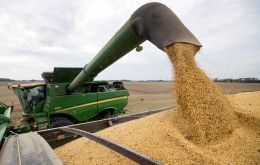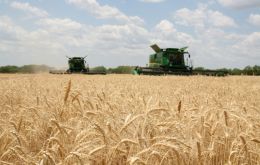MercoPress. South Atlantic News Agency
Agriculture
-
Friday, July 2nd 2021 - 08:49 UTC
Uruguayan meat processing plant may resume shipments to China after labelling incident in April

The Uruguayan BPU meat processing plant has been cleared to resume exports to China as of July 1 after it was banned April 9 due to a mislabelled shipment, it was announced Thursday.
-
Thursday, July 1st 2021 - 09:30 UTC
Soybean rise to US $ 532 a ton in Chicago

The price of soybeans sprang back to above US $ 500 in the Chicago market Wednesday after a US $ 33.2 rise fueled by a new report on stocks and planting from the Department of Agriculture of the United States (USDA).
-
Monday, June 28th 2021 - 09:38 UTC
Lacalle Pou replaces Uruguay's Livestock Minister

Uruguayan President Luis Lacalle Pou Sunday announced he shall be appointing current National Meat Institute head Fernando Mattos as the country's new Minister of Livestock, Agriculture and Fisheries instead of Carlos María Uriarte.
-
Wednesday, June 23rd 2021 - 08:59 UTC
Brazilian Government announces increased funding for agribusiness

The Government of Brazilian President Jair Bolsonaro Tuesday launched what was called “The Harvest Plan 2021/2022” for which funding worth R$ 251.2 billion (US $ 50.6 billion) for national agribusiness was allocated.
-
Wednesday, June 23rd 2021 - 06:42 UTC
Argentina expects a 19 million tons 2021/22 wheat harvest, with 12 million tons for export

Argentine wheat exports should reach 12 million tons in the 2021/22 winter harvest, according to a new estimate released by the Buenos Aires Cereals Exchange. If confirmed, the volume, the highest since 2016/17, will be 26.3% above this season's production.
-
Monday, June 21st 2021 - 09:40 UTC
Argentine freezes meat prices, exports to resume next week but not of all cuts

Argentine Minister of Productive Development Matías Kulfas Sunday admitted the administration of President Alberto Fernández plans to both ban exports of the beef cuts most coveted by local consumers and freeze domestic prices until late this year.
-
Friday, June 18th 2021 - 09:46 UTC
Argentina hopes to resume beef exports next week

Argentina's Minister of Productive Development, Matías Kulfas, Thursday said meat exports are to resume next week after details to ensure proper supply to local consumers are fine-tuned.
-
Friday, June 18th 2021 - 06:42 UTC
Scotland calls for UK/Australia trade deal to be ratified by Westminster and Holyrood

Scotland's First Minister has raised concerns about the impact of the UK/Australia trade deal announced this week on Scottish farmers and called for the agreement to be ratified by Westminster and Holyrood, according to the Edinburgh media.
-
Tuesday, June 15th 2021 - 09:15 UTC
Israel complains over disruption of Argentine meat supplies

Israel's ambassador to Buenos Aires, Galit Ronen, warned on Monday that her country will stop buying meat from Argentina and look for other suppliers if the export ban persists.
-
Monday, June 7th 2021 - 20:03 UTC
Food prices in May soared to its highest in a decade, FAO report

FAO – Global food prices rose in May at their fastest monthly rate in more than a decade, even as world cereal production is on course to reach a new record high, the Food and Agriculture Organization of the United Nations (FAO) reported.